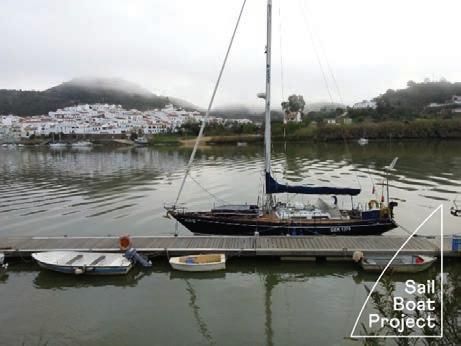
4 minute read
Boat lockdown
BY DHARA THOMPSON
“Lost at Sea” is a common euphemism for sailors. Dhara Thompson however, is a sailor stranded on land. This is his account of being on lockdown in a boat.
Advertisement
Sailing to the Algarve from the UK for a six-month break I did not expect the start of my return trip home to be interrupted by an emerging pandemic.
I had taken one of our sail-training vessels south for the winter after more than ten years involvement in Sail Boat Project, a community sailing school based in Chichester harbour. Now it was time to return, I collected my crew from Faro airport, watching their flight arrive from the anchorage directly under the flight path. With thoughts turning to home, it occurred to me how much Faro lagoon reminds me of Chichester Harbour, but with storks and flamingos.

Being on board, at sea and at anchor is a fairly isolated existence in normal times, but even we couldn't escape from the news and updates pouring out of our phones. It was only on going ashore at Portimão that reality clicked: police roadblocks stopping cars, businesses already shut up in the boatyard and people scrambling to get back afloat and rumours of cases of the virus in town.
We did a calm sweep of Lidl, as we had already planned anyway to stock up for the journey, but with an added sense of urgency. We'd heard of quarantine being mentioned to boats in the marina opposite where we were anchored. One of my crew, Elia, only had two weeks supply of his insulin, so he needed to go straight back to Faro for a return flight home the next day.
From there with my remaining crew member Rory, we motored further east in calm, dolphin-filled waters to the Guadiana River, which forms the southern border between Portugal and Spain. Anchored inside the river entrance, listening to Spanish radio, it appeared that the border may be shutting at midnight. With Rory's flight from Faro, the next morning would there even be trains running to get him there?
We made the decision to fill up with fuel on the Portuguese side in Villa Real, so Rory could jump ship and head for a night at Faro Airport. If the border was to shut I needed to be upriver, away from this wide stretch of border-river open to weather from the Atlantic. Quarantine and isolation didn't seem a very good prospect here, the final barrier was the reasonably low road bridge.

From previous crossings under it I worked out I would have 1-metre clearance above the top of the mast from 21:00 Portuguese time, that's 22:00 Spanish time, two hours before the border was closing. I was cutting it fine. Crossing under this bridge, with its spooky vibrations in the wind, challenges your faith in your tidal calculations at the best of times.
I turned the corner to see clusters of flashing blue lights at either end of the bridge. Motoring slowly under, I slipped into the countryside darkness, thankful for the newly-installed navigation lights. The next day I let the tide take me the final miles upriver just ahead of Guardia Civil and Policia Maritima ribs and patrol boats spending a few days making themselves visible on the river, but not stopping anyone.
I managed to get to the River Guadiana before lockdown and there's a really good sailing community here, which was part of my reason to head back here when I saw lockdown was coming. It's just me on the boat though, my parents both live in the UK and we are in regular contact.
My aunt and uncle live in Lagos and have been great for keeping me up to date with the news in Portugal. In a weird way, I have had more contact from friends in the last month than the previous six months I was away!
Occasional helicopter patrols still appear to make sure we all “stay at home". We've had some strong winds and thunderstorms to contend with but this would have been a lot worse on the coast where after only a month of lockdown boaters are struggling to make sense of the mixed messages from authorities. A Facebook group “Trapped at Sea" has sought to clarify these messages, provide solidarity to boats really caught out by quarantine (for example medical reasons) and lobby consuls as well as local authorities down here.

Structuring my day really helps and I have my own personal version of a watch system so if I drift I can look at my list for some ideas of things to do to reset my day. I schedule in calls with friends to have things to look forward to, especially in the evenings. Daytime, weather permitting, there are plenty of boat jobs to engage me. I am growing herbs and small veg plants onboard. There is also the rest of the team at Sail Boat Project to keep in touch with on Zoom calls, as we navigate our way through the impact on our business and how we make our living. I've started doing short video diaries and of course, there are our online navigational theory course students to continue to support.
As sailors, we are well placed to cope with periods of isolation, but instead of constantly shifting seascapes surrounding us, it is changes of a larger scale affecting everyone. On the other side of this though, the sea will still be there, and passages will be made again.
+INFO:
www.youtube.com/sailboatproject
www.sailboatproject.org
www.facebook.com/SailBoatProject











